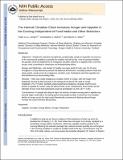| dc.contributor.author | Scheer, Frank A.J.L. | en_US |
| dc.contributor.author | Morris, Christopher J. | en_US |
| dc.contributor.author | Shea, Steven A. | en_US |
| dc.date.accessioned | 2014-03-10T16:17:18Z | |
| dc.date.issued | 2013 | en_US |
| dc.identifier.citation | Scheer, Frank A.J.L., Christopher J. Morris, and Steven A. Shea. 2013. “The Internal Circadian Clock Increases Hunger and Appetite in the Evening Independent of Food Intake and Other Behaviors.” Obesity (Silver Spring, Md.) 21 (3): 421-423. doi:10.1002/oby.20351. http://dx.doi.org/10.1002/oby.20351. | en |
| dc.identifier.issn | 1930-7381 | en |
| dc.identifier.uri | http://nrs.harvard.edu/urn-3:HUL.InstRepos:11877077 | |
| dc.description.abstract | Objective: Despite the extended overnight fast, paradoxically, people are typically not ravenous in the morning and breakfast is typically the smallest meal of the day. Here we assessed whether this paradox could be explained by an endogenous circadian influence on appetite with a morning trough, while controlling for sleep/wake and fasting/feeding effects. Design and Methods We studied 12 healthy non-obese adults (6 male; age, 20–42 year) throughout a 13-day laboratory protocol that balanced all behaviors, including eucaloric meals and sleep periods, evenly across the endogenous circadian cycle. Participants rated their appetite and food preferences by visual analog scales. Results: There was a large endogenous circadian rhythm in hunger, with the trough in the biological morning (8 AM) and peak in the biological evening (8 PM; peak-to-trough amplitude=17%; P=0.004). Similarly phased significant endogenous circadian rhythms were present in appetite for sweets, salty and starchy foods, fruits, meats/poultry, food overall, and for estimates of how much food participants could eat (amplitudes 14–25%; all P < 0.05). Conclusions: In people who sleep at night, the intrinsic circadian evening peak in appetite may promote larger meals before the fasting period necessitated by sleep. Furthermore, the circadian decline in hunger across the night would theoretically counteract the fasting-induced hunger increase that could otherwise disrupt sleep. | en |
| dc.language.iso | en_US | en |
| dc.relation.isversionof | doi:10.1002/oby.20351 | en |
| dc.relation.hasversion | http://www.ncbi.nlm.nih.gov/pmc/articles/PMC3655529/pdf/ | en |
| dash.license | LAA | en_US |
| dc.subject | Appetite | en |
| dc.subject | Circadian | en |
| dc.subject | Energy Balance | en |
| dc.subject | Hunger | en |
| dc.subject | Metabolism | en |
| dc.title | The Internal Circadian Clock Increases Hunger and Appetite in the Evening Independent of Food Intake and Other Behaviors | en |
| dc.type | Journal Article | en_US |
| dc.description.version | Version of Record | en |
| dc.relation.journal | Obesity (Silver Spring, Md.) | en |
| dash.depositing.author | Scheer, Frank A.J.L. | en_US |
| dc.date.available | 2014-03-10T16:17:18Z | |
| dc.identifier.doi | 10.1002/oby.20351 | * |
| dash.contributor.affiliated | Morris, Christopher J. | |
| dash.contributor.affiliated | Shea, Steven Andrew | |
| dash.contributor.affiliated | Scheer, Frank | |


